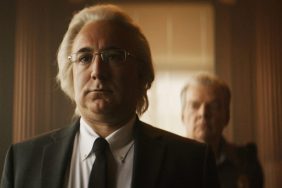NOTE: There are some slight spoilers for The Wolf of Wall Street in the following editorial.
Audiences are finally seeing and weighing in on The Wolf of Wall Street, as are critics, and a fascinating divide has broken out. On one side of the argument you have the people that see the film as a darkly comic satire and one that depends on the audience to recognize it as such. On the other is the camp believing it’s a film that glorifies Jordan Belfort (Leonardo DiCaprio) and his Stratton Oakmont co-horts as they snort endless lines of cocaine, treat women as their play things, defraud their clients and, more or less, get away with it all in the end. What is the cause of this divide?
Personally I don’t know how anyone can see it as a glorification of the activities that take place. It seems Martin Scorsese‘s decision to depict the debauchery as a satire is reason enough to say the film is partaking in the “fun” Belfort and his cronies are having. I saw it as a narrative decision, as a way to spice up the story so as not to go down the same, stereotypical dramatic road we’ve been down before.
I assume it makes people uncomfortable seeing these characters behave in such deplorable ways. I also think the fact it’s supposedly true on some level, along with a lack of strong punishment for their behavior, contributes to that discomfort. All of which, I’d say, contributes to the film’s core theme.

This is why I get a little perplexed when I read a quote from Stephanie Zacharek‘s review in the Village Voice where she writes, “One hour of that boorishness would be more than enough; by the end of the second, you might be wondering if anyone, including Scorsese, is ever going to call these guys on their self-absorbed idiocy.” Will anyone call them out? Yes Stephanie, you! You can call these guys out, that’s the point…
To that very point, an audience member could also revel in their behavior (should they be so inclined), which doesn’t mean the film does, it simply means they’d be a member of the audience that extols their behavior rather than condemns it. That’s on them, not the filmmakers.
Take for example the report from BusinessInsider where Steven Perlberg saw the film with an audience filled with Wall Street brokers. He writes, “When Belfort — a drug addict who later attempts to remain sober — rips up a couch cushion to get to his secret coke stash, there were cheers. Then, intercut with Popeye eating spinach, Belfort is irrevocably high on Quaaludes (or ‘ludes,’ a muscle relaxer) and dumps coke into his nose to remedy the situation — more cheers.”
Is Perlberg surprised at his audience’s behavior?
These are the same people that worship at the feet of Gordon Gekko, despite the fact Stanley Weiser, co-writer of the 1987 film Wall Street, has said of the film’s villain, “[W]hat I find strange and oddly disturbing is that Gordon Gekko has been mythologized and elevated from the role of villain to that of hero.”
The point, of course, is that it’s the audience’s responsibility to determine what is and isn’t acceptable behavior. For BusinessInsider’s Perlberg to write “the film could have done a better job making Belfort look like a villain” is ridiculous. Clearly every single person that looks down on what went on in the film sees him as one. Must Scorsese walk onto the screen and tell you himself what you’re watching isn’t acceptable behavior? Should he also lie and exaggerate the punishment Belfort received, or is it necessary to include a coda condemning the behavior, explicitly suggesting the filmmakers don’t support it? At what point is the onus on the audience to do a little work?
Remember, the events as depicted in this film aren’t anything new, a fact not lost on Christina McDowell who penned an open letter to the filmmakers in L.A. Weekly, stating Belfort had once been chosen to testify against her father. She condemned the picture writing, “Your film is a reckless attempt at continuing to pretend that these sorts of schemes are entertaining, even as the country is reeling from yet another round of Wall Street scandals.”
Yes, Christina, the country is “reeling” from another round of the scandals, at least the ones we know about, as for the rest of your point: I found the film entertaining. I believe Jordan Belfort and his ilk are the scum of the Earth. Those that find what he did entertaining, but at the same time something to aspire to, I have serious issues with. Do I feel this way because of the film or because that’s just who I am? Is it not possible to find enjoyment and condemnation in the same thing? Is it problematic I find everything Belfort did deplorable while also laughing my ass off at the Lemmon scenes?
I wonder, what does the audience that views the film as a glorification of excess think of the final scene? Do they find truth in it? Do they not see it as a depiction of the whole of society, enraptured by the criminal before them, ignoring his past transgressions, hoping he could teach them how to get rich? What do you think that scene was about? I’m genuinely asking.
Then I find the report from a recent Academy screening as posted on Facebook by actress Hope Holiday hilarious as she writes:
[L]ast night was torture at the Academy–“The Wolf Of Wall Street”—three hours of torture–same disgusting crap over and over again—after the film they had a discussion which a lot of us did not stay for–the elevator doors opened and Leonardo D. Martin S. and a few others got out then a screen writer ran over to them and started screaming–shame on you –disgusting–
Holiday felt was necessary to repeat the comment this screenwriter yelled out. “Shame on you!” I have to ask, shame on them for what exactly? You found the behavior disgusting. Good, you should. Belfort and his behavior is revolting based on what I’ve read, which is approximately one-third of his autobiography, which I stopped reading out of disgust. Yet, of that one-third, I’d say about two-thirds of the movie is taken from it.
Yes, what you watched was taken from Belfort’s book, which was published in 2007 and even has a sequel of its own, “Catching the Wolf of Wall Street“. Where is the outrage? And Belfort’s story is not yet over. In fact, he’s out there shopping an idea for a reality show that would see him stepping in to help others who have hit rock bottom. Wouldn’t you know it, more reality television idolatry on the way. Oh, the humanity!
I accept the fact a film can be interpreted many different ways, but at the same time I’m trying to understand the interpretation that believes Wolf of Wall Street glorifies the behavior depicted on screen. I’d love to hear from those that believe it’s some sort of celebration of excess.
I understand how there may be a difference of opinion as to whether or not its a satire considering the level of exaggeration (at least based on the book) is limited, but at the same time I don’t see how anyone could believe what they were seeing on screen was an example of what the filmmakers believed was good behavior as much as it was behavior of the characters depicted.
The film itself and this “controversy” (or, more specifically, a difference of opinion) reminds me of a quote from Oliver Stone while he was promoting Wall Street: Money Never Sleeps a few years back where he said, “Villains sometimes tend to rise above their role in life. They become heroes or anti-heroes. We lost our bearings in America, we’re living way beyond our means and people began to worship the idea of excess.”
Point is, Stone isn’t saying anything we don’t know, just as Wolf of Wall Street isn’t depicting a character foreign to anyone that pays even a modicum of attention to the news. We don’t need to have it spelled out for us. We know this behavior is bad and yet, as the final scene in the film shows, we don’t care. People are willing to scratch, claw and do whatever it takes to get to the top or even have the chance to believe wealth is attainable. This isn’t the film’s fault, this is just a fact of life.
The following is a quote from Leonardo DiCaprio after being asked by HitFix about audience members that see the film as more of an irresponsible glorification than a satirical takedown:
“I think anyone who thinks that missed the boat entirely… I think that anyone that thinks this is a celebration of Wall Street and this sort of hedonism — yes, the unique thing about Marty is that he doesn’t judge his characters. And that was something that you don’t quite understand while you’re making the movie, but he allows the freedom of this almost hypnotic, drug-infused, wild ride that these characters go on. And he allows you, as an audience — guilty or not — to enjoy in that ride without judging who these people are. Because ultimately, he keeps saying this: ‘Who am I to judge anybody?’ I mean ultimately I think if anyone watches this movie, at the end of Wolf of Wall Street, they’re going to see that we’re not at all condoning this behavior. In fact we’re saying that this is something that is in our very culture and it needs to be looked at and it needs to be talked about. Because, to me, this attitude of what these characters represent in this film are ultimately everything that’s wrong with the world we live in.”









